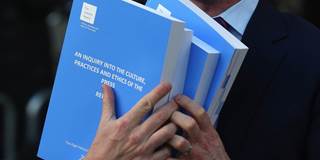Earlier this month, the former actor and comedian John Ford revealed that Rupert Murdoch’s Sunday Times newspaper employed him to hack and blag his way into the private affairs of dozens of prominent people. We need the press to protect us against abuses of state power; but we also need the state to protect us from abuses of media power.
LONDON – The poisoning of Russian double agent Sergei Skripal and his daughter Yulia at an Italian restaurant in Salisbury has driven an important story off the front pages of the British press. Earlier this month, the former actor and comedian John Ford revealed that for 15 years, from 1995 to 2010, he was employed by Rupert Murdoch’s Sunday Times newspaper to hack and blag his way into the private affairs of dozens of prominent people, including then-Prime Minister Gordon Brown.
Discussing the techniques he used, Ford said: “I did their phones, I did their mobiles, I did their bank accounts, I stole their rubbish.” Some of the most prominent names in British journalism are likely to be tarnished by this and other revelations of illegality and wrongdoing.
The basic plot goes back to the foundation of the free press with the abolition of licensing in 1695. To fulfill what has been seen since then as its distinctive purpose – holding power to account – a free press needs information. We expect a free press to investigate the exercise of power and bring abuses to light. In this context, one inevitably recalls the exposure of Watergate, which brought down President Richard Nixon in 1974.

LONDON – The poisoning of Russian double agent Sergei Skripal and his daughter Yulia at an Italian restaurant in Salisbury has driven an important story off the front pages of the British press. Earlier this month, the former actor and comedian John Ford revealed that for 15 years, from 1995 to 2010, he was employed by Rupert Murdoch’s Sunday Times newspaper to hack and blag his way into the private affairs of dozens of prominent people, including then-Prime Minister Gordon Brown.
Discussing the techniques he used, Ford said: “I did their phones, I did their mobiles, I did their bank accounts, I stole their rubbish.” Some of the most prominent names in British journalism are likely to be tarnished by this and other revelations of illegality and wrongdoing.
The basic plot goes back to the foundation of the free press with the abolition of licensing in 1695. To fulfill what has been seen since then as its distinctive purpose – holding power to account – a free press needs information. We expect a free press to investigate the exercise of power and bring abuses to light. In this context, one inevitably recalls the exposure of Watergate, which brought down President Richard Nixon in 1974.